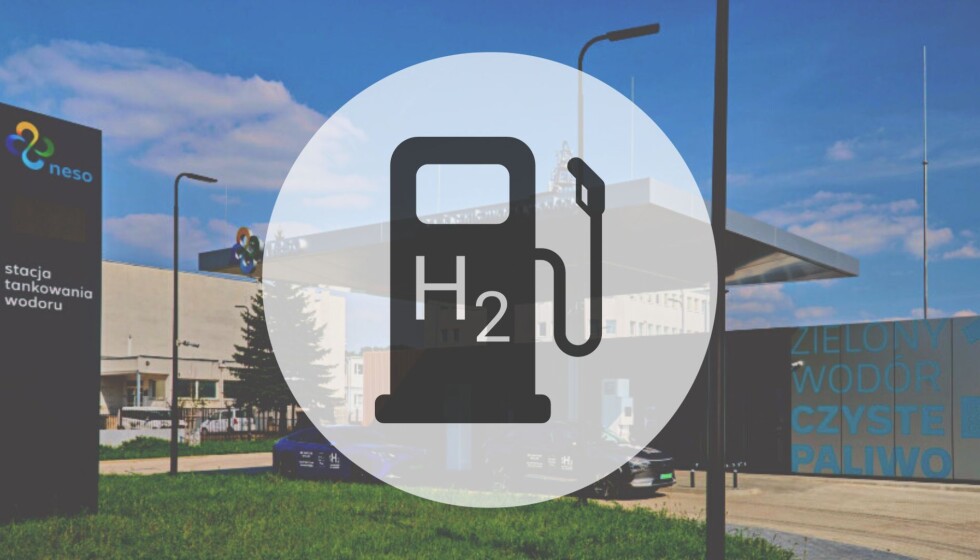
The first hydrogen gas station was opened in Poland. How much does it cost to refuel a hydrogen car?
The Polsat Plus Group and the ZE PAK Group built and launched the first public hydrogen filling station in Poland. We started with the capital — Warsaw. The station will be available to all owners of cars that run on hydrogen fuel. The network of such gas stations will be built under the NESO brand.
Both cars and buses can be refueled at the station. The refueling process is practically no different from refueling at a classic gas station and takes only a few minutes, the bus takes less than 15 minutes. Currently, cars running on hydrogen fuel can travel more than 600 kilometers on a single refueling. "They are equipped with an electric motor, just like electric cars with a battery, but they differ in the way of supplying energy. A hydrogen car has its own "small power plant" on board and does not need batteries. Hydrogen combines with oxygen, which is drawn from the air, and thus energy is produced. The battery of a hydrogen car is several dozen times smaller than that of classic electric cars. That is, the electric engine in a hydrogen car is powered by electricity that is produced directly during movement," says Macei Stets, vice president for strategic issues of the Polsat Plus group and member of the Supervisory Board of the ZE PAK group.
The following stations are already under development
In February of this year, PAK-PCE Stacje H2, which is part of the ZE PAK group and the Polsat Plus group, received PLN 20 million in funding from the National Environmental Protection and Water Management Fund for the construction of hydrogen stations in Poland. Thanks to this, Polsat Group intends to build five stations of this type — one each in Wroclaw, Rybnik, Gdańsk, Gdynia and Lublin. According to Samar Ivan Tomas Matviychuk, director of corporate communications, press secretary of the Polsat Plus group, the next station will be launched in Rybnik. As previously announced by the investor, the construction of these facilities and the start of sales of hydrogen fuel there are planned by June 30, 2024.
According to the plans of PAK-PCE Stacje H2, since the beginning of this year, approximately 30% of the capacity of each of the 5 hydrogen filling stations has been used, which will allow more than 10,000 refuelings of buses and other hydrogen vehicles. The company predicts that along with the development of the hydrogen car market in Poland, the use of hydrogen stations will also grow, reaching a level of approximately 85% by 2032.
How many hydrogen cars are there in Poland?
By the end of 2022, 80 hydrogen-powered Toyota Mirai cars and 35 hydrogen-powered Hyundai Nexos were registered in Poland. Between January and August 2023, 76 more hydrogen-powered cars were registered in the country, which is 85% more than a year ago. There were 35 of them. Hyundai Nexo and 41 pcs. Toyota Mirai. In addition, the ZE PAK group and the Polsat Plus group built the NESO hydrogen bus factory in Svidnik. The production of vehicles has already started, and the order for the city of Rybnyk has already been implemented. According to Tomas Matviychuk, the first five buses out of 20 ordered by the city are already ready. Regarding the entire hydrogen bus market in Poland, seven hydrogen buses were registered by the end of 2022, and two more have been registered since the beginning of this year.
What is the cost of refueling with hydrogen?
On September 7, the day the Warsaw NESO station was launched, a kilogram of hydrogen cost 69 zlotys. Toyota Mirai with a full tank — which is 5.5 kg of hydrogen — can travel 650 kilometers. So, 0.84 kg of hydrogen is needed for 100 kilometers. Thus, the cost of fuel for a hydrogen car today is 58 zlotys per 100 kilometers — at the current exchange rate, this is about 520 hryvnias. For comparison, to drive the same distance in a diesel car, which consumes 6 liters per 100 kilometers, as of today will cost about 38 zlotys (340 hryvnias) in Poland, and 320 hryvnias in Ukraine.
Subscribe to the Telegram channel of the Auto Market Research Institute to be the first to receive information without advertising or spam.


